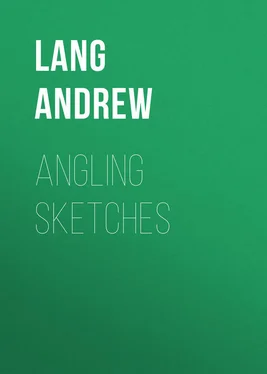Andrew Lang - Angling Sketches
Здесь есть возможность читать онлайн «Andrew Lang - Angling Sketches» — ознакомительный отрывок электронной книги совершенно бесплатно, а после прочтения отрывка купить полную версию. В некоторых случаях можно слушать аудио, скачать через торрент в формате fb2 и присутствует краткое содержание. Жанр: foreign_antique, foreign_prose, на английском языке. Описание произведения, (предисловие) а так же отзывы посетителей доступны на портале библиотеки ЛибКат.
- Название:Angling Sketches
- Автор:
- Жанр:
- Год:неизвестен
- ISBN:нет данных
- Рейтинг книги:3 / 5. Голосов: 1
-
Избранное:Добавить в избранное
- Отзывы:
-
Ваша оценка:
- 60
- 1
- 2
- 3
- 4
- 5
Angling Sketches: краткое содержание, описание и аннотация
Предлагаем к чтению аннотацию, описание, краткое содержание или предисловие (зависит от того, что написал сам автор книги «Angling Sketches»). Если вы не нашли необходимую информацию о книге — напишите в комментариях, мы постараемся отыскать её.
Angling Sketches — читать онлайн ознакомительный отрывок
Ниже представлен текст книги, разбитый по страницам. Система сохранения места последней прочитанной страницы, позволяет с удобством читать онлайн бесплатно книгу «Angling Sketches», без необходимости каждый раз заново искать на чём Вы остановились. Поставьте закладку, и сможете в любой момент перейти на страницу, на которой закончили чтение.
Интервал:
Закладка:
Difficult as it is, that river is so beautiful and alluring that it scarcely needs the attractions of sport. The step banks, beautifully wooded, and in spring one mass of primroses, are crowned here and there with ruined Border towers – like Elibank, the houses of Muckle Mou’ed Meg; or with fair baronial houses like Fernilea. Meg made a bad exchange when she left Elibank with the salmon pool at its foot for bleak Harden, frowning over the narrow “den” where Harden kept the plundered cattle. There is no fishing in the tiny Harden burn, that joins the brawling Borthwick Water.
The burns of the Lowlands are now almost barren of trout. The spawning fish, flabby and useless, are killed in winter. All through the rest of the year, in the remotest places, tourists are hard at them with worm. In a small burn a skilled wormer may almost depopulate the pools, and, on the Border, all is fish that comes to the hook; men keep the very fingerlings, on the pretext that they are “so sweet” in the frying-pan. The crowd of anglers in glens which seem not easily accessible is provoking enough. Into the Meggat, a stream which feeds St. Mary’s Loch, there flows the Glengaber, or Glencaber burn: the burn of the pine-tree stump. The water runs in deep pools and streams over a blue slatey rock, which contains gold under the sand, in the worn holes and crevices. My friend, Mr. McAllister, the schoolmaster at St. Mary’s, tells me that one day, when fish were not rising, he scooped out the gravel of one of these holes with his knife, and found a tiny nugget, after which the gold-hunting fever came on him for a while. But little is got nowadays, though in some earlier period the burn has been diverted from its bed, and the people used solemnly to wash the sand, as in California or Australia. Well, whether in consequence of the gold, as the alchemical philosophers would have held, or not, the trout of the Glengaber burn were good. They were far shorter, thicker and stronger than those of the many neighbouring brooks. I have fished up the burn with fly, when it was very low, hiding carefully behind the boulders, and have been surprised at the size and gameness of the fish. As soon as the fly had touched the brown water, it was sucked down, and there was quite a fierce little fight before the fish came to hand.
“This, all this, was in the olden time, long ago.”
The Glengaber burn is about twenty miles from any railway station, but, on the last occasion when I visited it, three louts were worming their way up it, within twenty yards of each other, each lout, with his huge rod, showing himself wholly to any trout that might be left in the water. Thirty years ago the burns that feed St. Mary’s Loch were almost unfished, and rare sport we had in them, as boys, staying at Tibbie Sheil’s famous cottage, and sleeping in her box-beds, where so often the Ettrick Shepherd and Christopher North have lain, after copious toddy. “’Tis gone, ’tis gone:” not in our time will any man, like the Ettrick Shepherd, need a cart to carry the trout he has slain in Meggat Water. That stream, flowing through a valley furnished with a grass-grown track for a road, flows, as I said, into St. Mary’s Loch. There are two or three large pools at the foot of the loch, in which, as a small boy hardly promoted to fly, I have seen many monsters rising greedily. Men got into the way of fishing these pools after a flood with minnow, and thereby made huge baskets, the big fish running up to feed, out of the loch. But, when last I rowed past Meggat foot, the delta of that historic stream was simply crowded with anglers, stepping in in front of each other. I asked if this mob was a political “demonstration,” but they stuck to business, as if they had been on the Regent’s Canal. And this, remember, was twenty miles from any town! Yet there is a burn on the Border still undiscovered, still full of greedy trout. I shall give the angler such a hint of its whereabouts as Tiresias, in Hades, gave to Odysseus concerning the end of his second wanderings.
When, O stranger, thou hast reached a burn where the shepherd asks thee for the newspaper wrapped round thy sandwiches, that he may read the news, then erect an altar to Priapus, god of fishermen, and begin to angle boldly.
Probably the troops who fish our Border-burns still manage to toss out some dozens of tiny fishes, some six or eight to the pound. Are not these triumphs chronicled in the “Scotsman?” But they cannot imagine what angling was in the dead years, nor what great trout dwelt below the linns of the Crosscleugh burn, beneath the red clusters of the rowan trees, or in the waters of the “Little Yarrow” above the Loch of the Lowes. As to the lochs themselves, now that anyone may put a boat on them, now that there is perpetual trolling, as well as fly-fishing, so that every fish knows the lures, the fun is mainly over. In April, no doubt, something may still be done, and in the silver twilights of June, when as you drift on the still surface you hear the constant sweet plash of the rising trout, a few, and these good, may be taken. But the water wants re-stocking, and the burns in winter need watching, in the interests of spawning fish. It is nobody’s interest, that I know of, to take trouble and incur expense; and free fishing, by the constitution of the universe, must end in bad fishing or in none at all. The best we can say for it is that vast numbers of persons may, by the still waters of these meres, enjoy the pleasures of hope. Even solitude is no longer to be found in the scene which Scott, in “Marmion,” chooses as of all places the most solitary.
Here, have I thought, ’twere sweet to dwell,
And rear again the chaplain’s cell.
But no longer does
“Your horse’s hoof tread sound too rude,
So stilly is the solitude.”
Stilly! with the horns and songs from omnibusses that carry tourists, and with yells from nymphs and swains disporting themselves in the boats. Yarrow is only the old Yarrow in winter. Ages and revolutions must pass before the ancient peace returns; and only if the golden age is born again, and if we revive in it, shall we find St. Mary’s what St. Mary’s was lang syne —
Ah, Buddha, if thy tale be true,
Of still returning life,
A monk may I be born anew,
In valleys free from strife, —
A monk where Meggat winds and laves
The lone St. Mary’s of the Waves.
Yarrow, which flows out of St. Mary’s Loch was never a great favourite of mine, as far as fishing goes. It had, and probably deserved, a great reputation, and some good trout are still taken in the upper waters, and there must be monsters in the deep black pools, the “dowie dens” above Bowhill. But I never had any luck there. The choicest stream of all was then, probably, the Aill, described by Sir Walter in “William of Deloraine’s Midnight Ride” —
Where Aill, from mountains freed,
Down from the lakes did raving come;
Each wave was crested with tawny foam,
Like the mane of a chestnut steed.
As not uncommonly happens, Scott uses rather large language here. The steepy, grassy hillsides, the great green tablelands in a recess of which the Aill is born, can hardly be called “mountains.” The “lakes,” too, through which it passes, are much more like tarns, or rather, considering the flatness of their banks, like well-meaning ponds. But the Aill, near Sinton and Ashkirk, was a delightful trout-stream, between its willow-fringed banks, a brook about the size of the Lambourne. Nowhere on the Border were trout more numerous, better fed, and more easily beguiled. A week on Test would I gladly give for one day of boyhood beside the Aill, where the casting was not scientific, but where the fish rose gamely at almost any fly. Nobody seemed to go there then, and, I fancy, nobody need go there now. The nets and other dismal devices of the poachers from the towns have ruined that pleasant brook, where one has passed so many a happy hour, walking the long way home wet and weary, but well content. Into Aill flows a burn, the Headshaw burn, where there used to be good fish, because it runs out of Headshaw Loch, a weed-fringed lonely tarn on the bleak level of the tableland. Bleak as it may seem, Headshaw Loch has the great charm of absolute solitude: there are no tourists nor anglers here, and the life of the birds is especially free and charming. The trout, too, are large, pink of flesh, and game of character; but the world of mankind need not rush thither. They are not to be captured by the wiles of men, or so rarely that the most enthusiastic anglers have given them up. They are as safe in their tarn as those enchanted fish of the “Arabian Nights.” Perhaps a silver sedge in a warm twilight may somewhat avail, but the adventure is rarely achieved.
Читать дальшеИнтервал:
Закладка:
Похожие книги на «Angling Sketches»
Представляем Вашему вниманию похожие книги на «Angling Sketches» списком для выбора. Мы отобрали схожую по названию и смыслу литературу в надежде предоставить читателям больше вариантов отыскать новые, интересные, ещё непрочитанные произведения.
Обсуждение, отзывы о книге «Angling Sketches» и просто собственные мнения читателей. Оставьте ваши комментарии, напишите, что Вы думаете о произведении, его смысле или главных героях. Укажите что конкретно понравилось, а что нет, и почему Вы так считаете.












